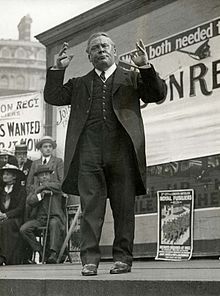Horatio Bottomley | |
|---|---|
 Bottomley addressing a WWI recruiting rally in Trafalgar Square, London, September 1915 | |
| Member of Parliament for Hackney South | |
| In office 28 December 1918 – 1 August 1922 | |
| Preceded by | Hector Morison |
| Succeeded by | Clifford Erskine-Bolst |
| In office 8 February 1906 – 16 May 1912 | |
| Preceded by | Thomas Herbert Robertson |
| Succeeded by | Hector Morison |
| Personal details | |
| Born | 23 March 1860 London, England |
| Died | 26 May 1933 (aged 73) London, England |
| Political party | Liberal (1906–1912) Independent (1918–1922) |
Horatio William Bottomley (23 March 1860 – 26 May 1933) was an English financier, journalist, editor, newspaper proprietor, swindler, and Member of Parliament. He is best known for his editorship of the popular magazine John Bull, and for his nationalistic oratory during the First World War. His career came to a sudden end when, in 1922, he was convicted of fraud and sentenced to seven years' imprisonment.
Bottomley spent five years in an orphanage before beginning his career, aged 14, as an errand boy. Subsequent experience as a solicitor's clerk gave him a useful knowledge of English law, which he later put to effective use in his court appearances. After working as a shorthand writer and court reporter, at 24 he founded his own publishing company, which launched numerous magazines and papers, including, in 1888, the Financial Times.[1] He overreached with an ambitious public flotation of his company, which led to his first arraignment on fraud charges in 1893. Despite evidence of malpractice, Bottomley, who defended himself, was acquitted. He subsequently amassed a fortune as a promoter of shares in gold-mining companies.
In 1906 Bottomley entered parliament as the Liberal Party member for Hackney South. In the same year, he founded the popular magazine John Bull, which became a platform for Bottomley's trenchant populist views. Financial extravagance and mismanagement continued to blight his career, and in 1912 he had to resign from parliament after being declared bankrupt. The outbreak of war in 1914 revived his fortunes; as a journalist and orator, Bottomley became a leading propagandist for the war effort, addressing well over 300 public meetings. His influence was such that it was widely expected that he would enter the War Cabinet, although he received no such offer.
In 1918, having been discharged from bankruptcy, Bottomley re-entered parliament as an Independent member. In the following year, he launched his fraudulent "Victory Bonds" scheme which, when exposed, led to his conviction, imprisonment and expulsion from parliament. Released in 1927, he attempted unsuccessfully to relaunch his business career and eked out a living by lecturing and appearances in music halls. His final years before his death in 1933 were spent in poverty.
- ^ "Horatio Bottomley". Financial Times. Archived from the original on 19 September 2018. Retrieved 19 September 2018.